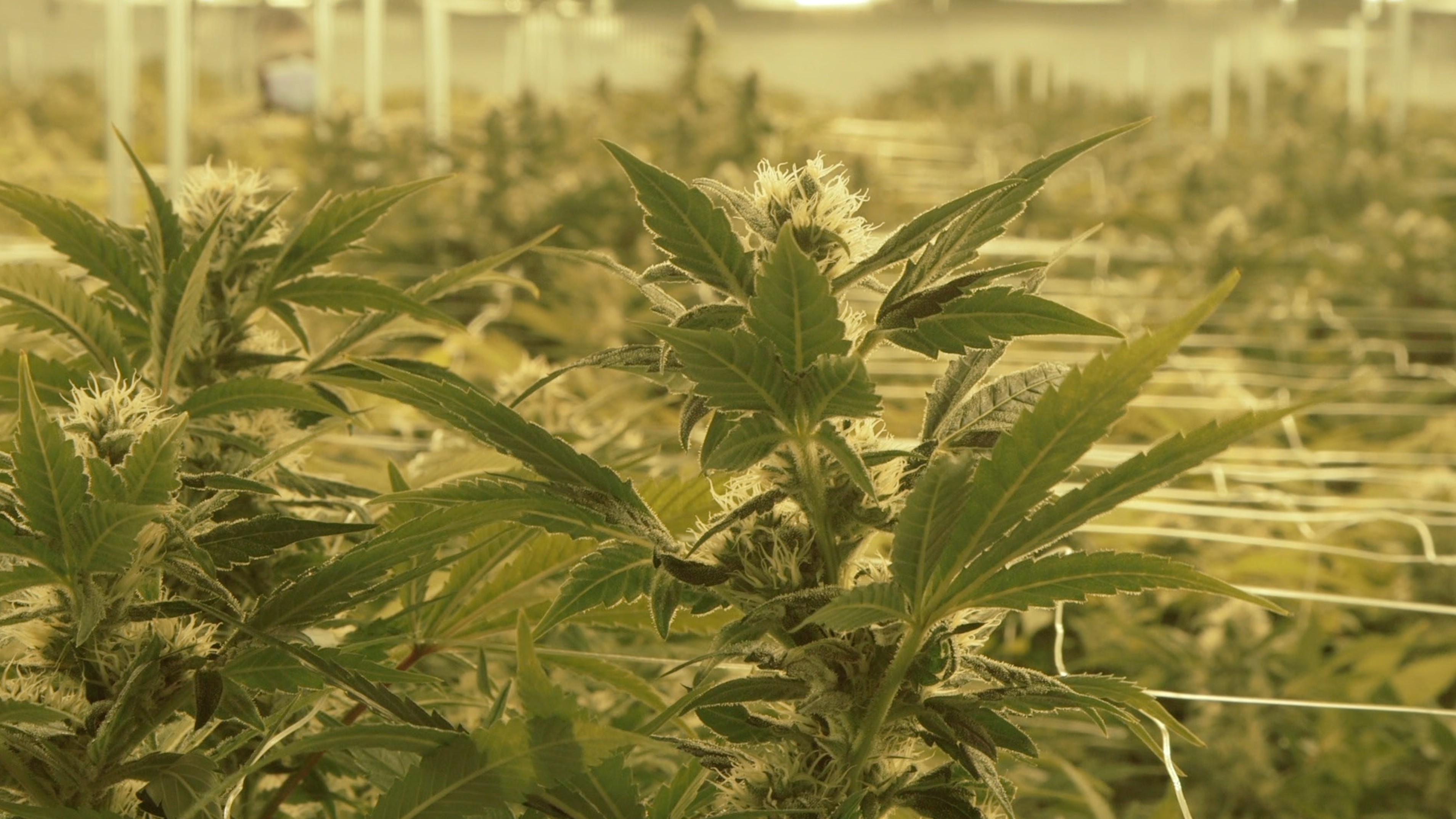No question, it's been a brutal couple of years for Canada's oil patch.You have a province of devout capitalists sitting on top of Earth's third largest oil reserve, yet we know burning all of it would make the planet irreversibly less habitable. Throw in an oil price crash, surprise non-conservative takeover, and a tragic wildfire, you have the makings of a binge-watchable Netflix drama.I know Albertans probably don't want me—a nature-loving Vancouver coastal elite or whatever—worrying about them. But watching all this unfold from west of the Rockies, I can't help hoping and cheering for Canada's Texas to overcome job losses AND existential climate threats. (Recent "phase out" misspeakings aside, I think we all agree both would be ideal?)
Advertisement
Anyway, this is why I was excited to discover that Edmonton's airport, of all places, will soon host the world's biggest weed grow-op. A Vancouver-based company called Aurora Cannabis has announced plans to build an indoor medical marijuana production facility the size of nine football fields.The company is selling the project as an economic boost for a still-struggling province. Aurora's CEO told Business in Vancouver he's proud of the plan because "it will become an important contributor to the local economy, both through investments and job creation."
Rendering of the "world's most advanced cannabis facility." Image via Aurora Cannabis
Let's try to appreciate how massive this thing is for a second: at 800,000 square feet, it's more than four times the square footage of the nearest Costco. Alberta's only other legal grow op (also owned by Aurora) is one-sixteenth the size. It's basically the weed version of the West Edmonton Mall.The Aurora plant will be capable of producing 110 metric tons of cannabis per year. For some perspective, the government expects Canadians as a whole will consume about 655 tons of weed by 2018, once a legal market is in place.If anyone is going to take weed to corporate extremes, it's going to be Alberta. Which makes it somewhat easier to imagine an alternative universe wherein a multi-billion-dollar weed boom saves the economy.I know oil is back over $50 a barrel and Alberta might do just fine this year. But for an an experiment in extreme wishful thinking, I reached out to Western University economist Mike Moffatt to figure out how plausible this "weed patch" reality would be. He told me it could definitely become a major part of Alberta's economy, but it's not catching up to the oil sands anytime soon.
Advertisement
Read More: Canadians and Americans Spent $72 Billion on Weed Last YearOur first task was to figure out how big Alberta's weed market could possibly get. A recent study by Deloitte pegged the Canada-wide maximum at $22 billion, including lab testing, security, and other related fields. According to the study's author Mark Whitmore, that's similar to the size Canada's entire alcohol industry.Accounting for Alberta's population, Moffatt and I settled on somewhere between one and two billion for Alberta's homegrown weed market. "Which is not nothing," he told VICE. But next to Alberta's oil sands and related industries, it's pennies on the dollar. "Compare that to $60 billion just from oil exports, and billions more in services around that," he said, "we're talking maybe one or two percent of the size." Now, some weed advocates do contest the Deloitte figure. Craig Jones, executive director of NORML, suggested there would be a much larger opportunity if Canada was allowed to export to the US and other countries. Though British Columbia probably has a stronger brand opportunity, Alberta could stake its own claim on the global scene.But Moffatt pointed out that getting into the global weed market might not shield Alberta from the kind of price fluctuations its oil sands industry has been fighting against these past two years. "I would treat it as any other agricultural commodity, so you probably would have the potential for price volatility," he said.
Now, some weed advocates do contest the Deloitte figure. Craig Jones, executive director of NORML, suggested there would be a much larger opportunity if Canada was allowed to export to the US and other countries. Though British Columbia probably has a stronger brand opportunity, Alberta could stake its own claim on the global scene.But Moffatt pointed out that getting into the global weed market might not shield Alberta from the kind of price fluctuations its oil sands industry has been fighting against these past two years. "I would treat it as any other agricultural commodity, so you probably would have the potential for price volatility," he said.

Advertisement
This is something we've already seen happening in Washington State, where weed has been legal for a few years now. In fall 2014, a massive crop of sun-grown weed flooded the Seattle market. Prices at dispensaries dropped from over $20 to $4 a gram, lots of pot went unsold, and growers called it an "economic nightmare." That's nothing compared to crude's tumble from $120 to $30, but a potential headache nonetheless.Read More: Everything Your Weed Guy Knows About Weed Is Probably WrongThat, and pot industry leaders might not stick around if the climate or economic conditions aren't ideal. "It's going to be grown where the best conditions are. I don't know why Alberta would have an advantage over Vancouver Island or southwestern Ontario." One great thing for Alberta, is that there would be a sizable stream of government revenue, mostly from taxing the consumer side.I asked Moffatt to come out on a limb with me, and imagine what would have to happen to for weed to surpass the oil sands as Alberta's biggest money maker. What if, say, 50 years down the road, oil sands production has been scaled back to meet real, enforceable international climate targets, and weed has taken off as a new centrepiece of Alberta's economy?Though highly improbable, Moffatt agreed this would have to be part of a post-carbon economy, where oil sands have been closed down almost entirely. "We're probably talking about pretty much shutting down the oil sands. If you shut that down and just kept some conventional oil, that would probably be comparable."But realistically, if anything is going to replace the oil sands as Alberta's cash cow, it's going to be some kind of alternative energy, says Moffatt. There just isn't enough demand for weed to sustain that kind of single-resource market. Then again, cannabis activist Jodie Emery told VICE hemp biofuels have the potential to shake things up in coming decades. And based on events of the last week, truly nothing seems impossible."I think it can become a significant part of the economy," Moffatt told VICE. "Is it going to be the dominant industry? Probably not. But that might not be a bad thing."Follow Sarah on Twitter.
